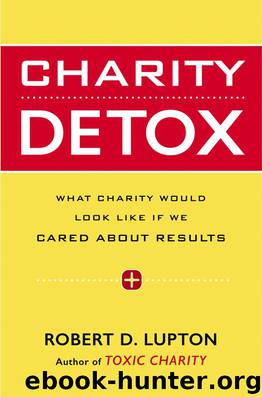Charity Detox by Robert D. Lupton

Author:Robert D. Lupton
Language: eng
Format: mobi
Publisher: HarperCollins
Published: 2015-05-06T06:00:00+00:00
Misallocation of Funds
OUR MISSION BUDGETS ARE at an all-time high, and yet our full-time missionaries are at a hundred-year low. It’s worth asking, then: How is this new arrangement working?
In terms of cost-effectiveness, the present system is abysmal. The two million short-term missionaries the Western church deploys annually consume somewhere between $3.5 and $5 billion of our overall mission expenditure. A Delta Air Lines official recently told me that a full half of their Central and South American flights would have to be terminated if not for the traffic coming and going on mission trips. Our mission budgets may well be at an all-time high, but Delta is getting a sizable chunk of that money.
And how are the partnerships working on the ground? Juan Iello, president of one of Nicaragua’s most successful microlending ministries, told me that there are entire sections of his country where he is unable to provide any microloans. It’s not an accident that these areas are the same ones with a high concentration of U.S. church partnerships. “They are turning my people into beggars!” Juan declared with great emotion. “My people say, ‘Why do we want to borrow money? The churches give it to us. Why do we want to borrow money to build a church? They build it for us.’”
The more mature U.S. mission partners understand the danger of dependency. They emphasize the importance of mutual relationships. Though they are still willing to spend the majority of their mission dollars on airfare, they refrain from giving money directly to their indigenous partners. They feel good about training and volunteering but prefer relationship-building activities over financial support. After mutual relationships have been built, loans or matching gifts may be acceptable as start-up investments for orphanages or health clinics or schools. Such grants may be on a multiyear basis but on a declining scale, to ensure local self-sufficiency. And sometimes such grants work. But often, when the missionaries have gone home, there develop misunderstandings over how the money is being spent, concerns over inadequate financial management, disagreements about mission priorities, dissatisfaction over leadership capabilities and communication. There is a fine line between accountability and control. It is hard to maintain a good partnership when you are half a world away.
Value differences may be the most difficult challenge to forming lasting partnerships. In this country, when a manager or trusted employee uses the resources of an organization for his or her own personal gain, an ethical red flag immediately begins to wave. Approved perks, such as a company car, may be perfectly acceptable. But unauthorized misallocation of funds is seen as crossing the line. Embezzling or outright theft is cause for immediate firing. That reflects American business ethics. But, in other lands, ethics are often different. In some cultures, for instance, skimming some of the unguarded assets of a wealthy company from the top is expected, because every Western-funded organization is considered wealthy.
The Opportunity Nicaragua board discovered this when we told employees at our Nicaragua food-processing operation that they could be fired for embezzling funds.
Download
This site does not store any files on its server. We only index and link to content provided by other sites. Please contact the content providers to delete copyright contents if any and email us, we'll remove relevant links or contents immediately.
| Adult Ministry | Children's Ministry |
| Counseling & Recovery | Discipleship |
| Evangelism | Missions & Missionary Work |
| Preaching | Sermons |
| Youth Ministry |
The Rape Of Nanking by Iris Chang(2325)
The Secret Power of Speaking God's Word by Joyce Meyer(2253)
Chosen by God by R. C. Sproul(1760)
Crash the Chatterbox by Steven Furtick(1655)
Knowing God by J.I. Packer(1432)
Habits of Grace by David Mathis(1422)
How To Be Born Again by Billy Graham(1404)
A Prophet with Honor by William C. Martin(1373)
Peace with God by Billy Graham(1319)
God's Smuggler by Brother Andrew(1219)
Confronting Christianity by Rebecca McLaughlin(1193)
Whisper by Mark Batterson(1156)
Angel Dreams by Virtue Doreen Virtue Melissa(1140)
Missionaries by Norman Lewis(1136)
The Truth War by John MacArthur(1106)
The School of Biblical Evangelism by Ray Comfort(1100)
The Poems of Rowan Williams by Rowan Williams(1072)
Do Greater Things by Robby Dawkins(1047)
Eucharistic Miracles by Cruz Joan Carroll(1017)
